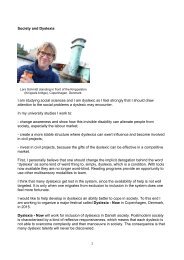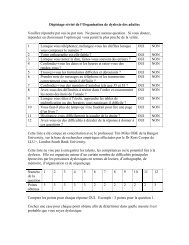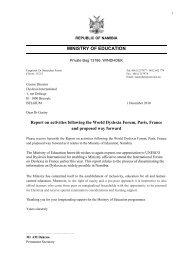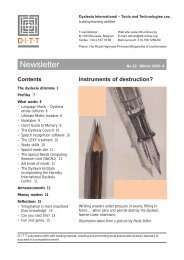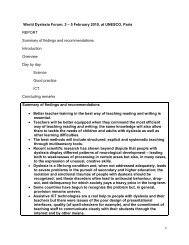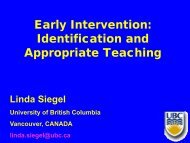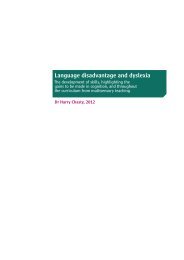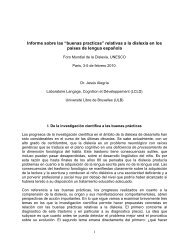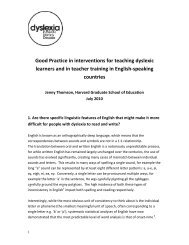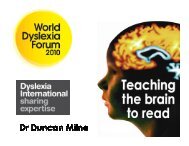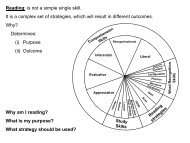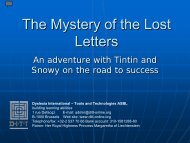ANNUAL REPORT 2012 - Dyslexia International
ANNUAL REPORT 2012 - Dyslexia International
ANNUAL REPORT 2012 - Dyslexia International
You also want an ePaper? Increase the reach of your titles
YUMPU automatically turns print PDFs into web optimized ePapers that Google loves.
MOVING<br />
FORWARDS<br />
<strong>ANNUAL</strong> <strong>REPORT</strong> <strong>2012</strong>
Contents<br />
3 <strong>Dyslexia</strong> <strong>International</strong> at a Glance<br />
Vision; Objective; History<br />
6 Letter from the Chair<br />
9 Operational Review<br />
e-Campus; Teacher training; Webinar<br />
14 People<br />
15 Accounts<br />
17 Auditor’s Report<br />
2/18 <strong>Dyslexia</strong> <strong>International</strong> Annual Report <strong>2012</strong>
<strong>Dyslexia</strong><br />
<strong>International</strong><br />
at a glance<br />
Vision<br />
To see dyslexia addressed within education systems worldwide,<br />
and fully understood as an inhibitor to personal development and<br />
social integration unless it is identified and addressed.<br />
Objective<br />
To build the <strong>Dyslexia</strong> <strong>International</strong> e-Campus into a sustainable<br />
service for education authorities, trainers and teachers worldwide<br />
- a venue for education providers to share knowledge and ideas,<br />
and for teachers and trainers to access quality, scientificallyvetted<br />
courses and resources, free of charge, to enhance their<br />
teaching capabilities.<br />
3/18 <strong>Dyslexia</strong> <strong>International</strong> Annual Report <strong>2012</strong>
<strong>Dyslexia</strong><br />
<strong>International</strong><br />
at a glance<br />
History<br />
2000 2000 2001<br />
2003<br />
<strong>Dyslexia</strong><br />
<strong>International</strong> Tools<br />
and Technologies<br />
ASBL, not-forprofit<br />
organization,<br />
founded in Brussels<br />
and registered in the<br />
Moniteur belge.<br />
BBC Language<br />
Shock – <strong>Dyslexia</strong><br />
across cultures,<br />
awarenessraising<br />
film with<br />
accompanying guide<br />
widely distributed,<br />
also to ministries of<br />
education.<br />
Her Royal Highness<br />
HRH Princess<br />
Margaretha of<br />
Liechtenstein<br />
becomes Patron.<br />
Tintin helps dyslexic<br />
learners – The<br />
Mystery of the Lost<br />
Letters a tri-lingual<br />
self-help tool to<br />
assist mentors and<br />
encourage learners<br />
on a journey of selfdiscovery,<br />
produced<br />
by the BBC for<br />
<strong>Dyslexia</strong> <strong>International</strong>;<br />
launched at the Royal<br />
Palace Brussels<br />
in the presence<br />
of Her Majesty<br />
Queen Fabiola, and<br />
later disseminated<br />
worldwide.<br />
4/18 <strong>Dyslexia</strong> <strong>International</strong> Annual Report <strong>2012</strong>
<strong>Dyslexia</strong><br />
<strong>International</strong><br />
at a glance<br />
History continued<br />
2006 2008 2010<br />
<strong>2012</strong> <strong>2012</strong><br />
<strong>Dyslexia</strong><br />
<strong>International</strong> (DI)<br />
granted operational<br />
status with The<br />
United Nations<br />
Educational,<br />
Scientific and<br />
Cultural Organization<br />
(UNESCO).<br />
With Microsoft<br />
School Technology<br />
Innovation Center,<br />
Brussels organization<br />
of a webinar in 20<br />
countries on <strong>Dyslexia</strong>:<br />
Neuroscience and<br />
cognitive psychology,<br />
with Professors<br />
Stanislas Dehaene,<br />
José Morais and<br />
John Stein.<br />
First World <strong>Dyslexia</strong><br />
Forum organized at<br />
UNESCO ministries<br />
of education of<br />
over 190 countries<br />
invited to attend;<br />
UNESCO Goodwill<br />
Ambassador HRH<br />
The Grand Duchess<br />
Maria Teresa of<br />
Luxembourg spoke of<br />
the pressing demand<br />
for free access to<br />
higher education –<br />
an ‘e-Campus’.<br />
<strong>Dyslexia</strong><br />
<strong>International</strong><br />
organized a<br />
second webinar<br />
with 10 countries<br />
on Illiteracy in the<br />
prison population<br />
hosted by Microsoft<br />
School Technology<br />
Innovation Center.<br />
With professors Elena<br />
Grigorenko and Linda<br />
Siegel, and experts<br />
Marion Walker and<br />
Melanie Jameson.<br />
A fully functional<br />
Beta version of<br />
the e-Campus was<br />
launched at UNESCO<br />
on 5 October, World<br />
Teachers Day, in the<br />
presence of <strong>Dyslexia</strong><br />
<strong>International</strong>’s Patron<br />
and UNESCO<br />
Assistant Director<br />
General Education,<br />
Mr. Tang.<br />
5/18 <strong>Dyslexia</strong> <strong>International</strong> Annual Report <strong>2012</strong>
Letter from<br />
the Chair<br />
In <strong>2012</strong> UN Secretary-General Ban Ki-moon<br />
announced his ‘Education First’ policy at<br />
UNESCO, urging all NGOs working in education<br />
to make a major drive, ‘Un Grand Effort’, to reach<br />
the Millennium Development Goals by 2015:<br />
quality education for all.<br />
<strong>Dyslexia</strong> <strong>International</strong> fully endorses this policy<br />
and addresses it by ensuring that Open Education<br />
Resources for teacher training in literacy and<br />
inclusion are accessible to teachers worldwide.<br />
In February, following a meeting at UNESCO on<br />
‘Relations with Member States, Intergovernmental<br />
and Non-governmental Partners’, <strong>Dyslexia</strong><br />
<strong>International</strong> was honoured to be granted<br />
‘consultative status’ in its partnership with UNESCO.<br />
From September through to December we took an<br />
active part in meetings to determine new criteria for<br />
these relations.<br />
Much of our energy throughout the year went into<br />
re-positioning ourselves as we followed up the<br />
conclusions of our forward planning activities,<br />
finalized in early <strong>2012</strong>. We looked at how best to<br />
maximize the benefits of new emerging technological<br />
solutions that allowed us to meet our primary<br />
objective: to make enhanced teacher training<br />
widely available as a means of attaining free and fair<br />
education for all and equal opportunities for students<br />
with specific learning difficulties whose needs are<br />
still not being met.<br />
‘Policies that effectively address teacher training<br />
and retention should be at the core of national<br />
education policies.<br />
‘Children have a fundamental right to free<br />
primary schooling of good quality. Governments<br />
have pledged to uphold this right. I am deeply<br />
concerned that education is slipping down the<br />
international priority list. Education First stems<br />
from my resolve to answer the call of parents<br />
everywhere for the schooling their children<br />
deserve - from the earliest years to adulthood. We<br />
must place education at the heart of our social,<br />
political and development agendas.<br />
‘When we put education first, we can end wasted<br />
potential and look forward to stronger and better<br />
societies for all.’<br />
Ban Ki-moon, Secretary-General<br />
of the United Nations<br />
The high point of <strong>2012</strong> was the launch of our new<br />
Beta site offering, for the first time, scientificallybased,<br />
high quality online teacher training materials<br />
on how to identify and address dyslexia free of<br />
charge. All visitors to www.dyslexia-international.<br />
org were able to access our Open Courseware and<br />
Open Educational Resources at an ’e-Campus’<br />
for teachers and trainers, a ‘Meeting Place’ for<br />
6/18 <strong>Dyslexia</strong> <strong>International</strong> Annual Report <strong>2012</strong>
Letter from<br />
the Chair<br />
education authorities and a ‘Country by Country<br />
Contacts Directory’ for guidance to local ministries,<br />
universities and associations in over 190 countries.<br />
Following the Congress we warmly welcomed<br />
experts in OER Neil Butcher and Professor Ken<br />
Harley who accepted to join our Open Educational<br />
Resources Advisory Panel, and Professor Diane<br />
Laurillard of London University, a member of the<br />
Management Committee of the UNESCO Institute<br />
for Information Technology in Education. Their<br />
guidance has been invaluable.<br />
Our plans are to ensure that our new OER site is<br />
regularly updated and replenished systematically<br />
by our consultants and research assistants with the<br />
support of our associate universities. To formalize<br />
this system we are working towards setting up a<br />
consortium of universities, one in each of the official<br />
languages of UNESCO – Arabic, Chinese, English,<br />
French, Russian and Spanish. This would become<br />
fully operational in 2014 by which time we will have<br />
submitted a formal application to the ‘UNESCO<br />
UNITWIN’ programme for a four-year research<br />
programme, chaired by a lead university in online<br />
teacher training, literacy and inclusion. The research,<br />
involvement at all levels and outcomes will be<br />
recorded on the e-Campus.<br />
32m<br />
‘Some 32 million U.S. adults lack basic prose<br />
literacy skills. That means they can’t read<br />
a newspaper or the instruction on a bottle<br />
of pills.’ – U.S. Education Department,<br />
January 2009<br />
20 %<br />
‘One fifth of school-leavers are so illiterate<br />
and innumerate that they struggle to cope<br />
with challenges of everyday life.’ – U.K.<br />
The Guardian, 7 May 2010<br />
The way forward<br />
We now greatly look forward to working with the<br />
Coursera team of Stanford University, USA, who<br />
have agreed to collaborate with us on a new version<br />
of the online course. The challenge is to make<br />
this available as part of Stanford’s Professional<br />
Development program for teachers in May 2013,<br />
either through our own team or with a Coursera<br />
partner university.<br />
7/18 <strong>Dyslexia</strong> <strong>International</strong> Annual Report <strong>2012</strong>
Letter from<br />
the Chair<br />
<strong>Dyslexia</strong> <strong>International</strong> will continue to expand<br />
awareness of its activities through social media and<br />
to raise the requisite funds.<br />
Acknowledgements<br />
Our heartfelt thanks go to the Oak Foundation<br />
whose support enables us to respond to these new<br />
challenges.<br />
Our progress and achievements are due to the<br />
commitment and generosity of all our associates<br />
– our Board members and supporters, our skilled<br />
volunteers who give so generously of their time,<br />
our Scientific Advisory Panel and Consultancy<br />
team, our Regional Ambassadors in China, Ghana,<br />
Lebanon, Cameroon and other countries and those<br />
acting as Special Envoys training in situ in Africa and<br />
elsewhere, our excellent webmaster, our auditor our<br />
Teacher training consultant and the President of our<br />
Literacy for All fund-raising team.<br />
<strong>Dyslexia</strong> <strong>International</strong> does not sell<br />
or buy education.<br />
It is sustained principally by<br />
charitable grants, private<br />
sponsorship and then by a measure<br />
of state funding.<br />
It welcomes charitable giving by<br />
all those who desire equality in<br />
education and all children and adults<br />
given the right to read.<br />
Times of transition as we move office and streamline<br />
our activities are demanding. For reliability and<br />
efficiency Barry O’Halpin as Office Manager<br />
deserves special commendation.<br />
The presence and encouragement of Our Patron<br />
HRH Princess Margaretha of Liechtenstein remain a<br />
constant source of encouragement and inspiration to<br />
us all.<br />
We look forward to building on the sure foundations<br />
we have laid this year by fully exploiting the<br />
new ways forward technology offers in both<br />
communications and teacher training.<br />
Judith Sanson<br />
Chair, Board of Directors<br />
8/18 <strong>Dyslexia</strong> <strong>International</strong> Annual Report <strong>2012</strong>
Operational<br />
Review<br />
1. e-Campus<br />
2. Teacher training<br />
3. Webinar<br />
Highlights<br />
20,000<br />
e-Campus: 20,000 pages visited in<br />
March 2013<br />
3,000<br />
Teachers in 3,000 francophone Belgian schools<br />
are being trained.<br />
8<br />
Eight leading research scientists and<br />
psychologists join our Scientific<br />
Advisory Panel.<br />
Web traffic, top six, by bandwidth,<br />
March 2013<br />
Others (not specified)<br />
Belgium<br />
UK<br />
France<br />
South Africa<br />
Switzerland<br />
9/18 <strong>Dyslexia</strong> <strong>International</strong> Annual Report <strong>2012</strong>
Operational<br />
Review<br />
1. e-Campus<br />
2. Teacher training<br />
3. Webinar<br />
1. e-Campus<br />
In <strong>2012</strong> the web site was completely redesigned<br />
and restructured in both French and English,<br />
running under a content management system<br />
with clear menus and submenus to help viewers<br />
find the materials.<br />
A film library was created which includes excerpts<br />
featuring success stories from our CD-ROM Tintin<br />
helps dyslexia learners. Added to this part, thanks to<br />
generous funding provided by our founder member,<br />
André Poncelet, is a dubbed version in English of<br />
the film <strong>Dyslexia</strong> – How to weave a solid structure<br />
of support, which was first created in French to<br />
augment the online course in that language.<br />
There is a software section of free IT aids, critiqued<br />
by E.A. Draffan of Southampton University. A Test<br />
Centre has been added with addresses of web sites<br />
that provide free diagnostic tools.<br />
A Reading Room includes articles and papers by<br />
Professors Shaywitz and Stein, and Drs Ramus and<br />
Chasty. The latter is a greatly expanded and updated<br />
version of the paper Dr Chasty delivered at the World<br />
<strong>Dyslexia</strong> Forum in 2010. It was prepared for us by<br />
students in the department of typography at the<br />
University of Reading, UK. (This team is also working<br />
on the English version of Dr Milne’s book Teaching<br />
the brain to read.)<br />
Images above. Screenshots from the e-Campus<br />
Image below. Dr Milne’s book<br />
The ‘Laboratory’ explains how modern scientific<br />
methods of research are throwing ever greater<br />
light on the causes of developmental dyslexia,<br />
including the fields of psychology, neuroimaging,<br />
electroencephalography, genetics, molecular biology,<br />
neuroscience and anatomy.<br />
10/18 <strong>Dyslexia</strong> <strong>International</strong> Annual Report <strong>2012</strong>
Operational<br />
Review<br />
1. e-Campus<br />
2. Teacher training<br />
3. Webinar<br />
1. e-Campus continued<br />
‘Language Departments’ is in embryo as we work<br />
towards sites with materials and links principally<br />
to the other four of UNESCO’s working languages,<br />
namely Arabic, Chinese, Russian and Spanish, but<br />
there also some materials already in German, Italian<br />
and Portuguese. Portuguese and Arabic translations<br />
have been made and await adaptation into the online<br />
format. Chinese, Russian and Spanish adaptations<br />
are under discussion.<br />
Monitoring the web site<br />
Google Analytics and Advanced Web Stats are<br />
compiled and examined every month. They show<br />
heavy use in the UK, USA, France, Belgium and<br />
Switzerland, with Brazil and South Africa, Germany,<br />
Italy and Spain also prominent. These data correlate<br />
well with other sources of information such as<br />
reports and letters from ministries, which are<br />
recorded and updated on our web site.<br />
Favourite downloads are Dr Milne’s book in<br />
French Apprendre au cerveau à lire and Harvard<br />
Professor Jenny Thomson’s survey of best practice<br />
in Anglophone countries presented at the World<br />
<strong>Dyslexia</strong> Forum. Also downloaded are tests and<br />
word lists from the online course.<br />
Image above. Far right: Dr Franck Ramus, senior<br />
research scientist at the Laboratoire de Sciences<br />
Cognitives et Psycholinguistique, Département<br />
d’Etudes Cognitives, Ecole Normale Supérieure,<br />
Paris, France; member of <strong>Dyslexia</strong> <strong>International</strong>’s<br />
Scientific Advisory Panel. Middle: Mr Ronald<br />
Thorpe, President of the National Board for<br />
Professional Teaching Standards, USA<br />
Image below. From left to right: Toon Cox,<br />
journalist; Barry O’Halpin, Office Manager; Judith<br />
Sanson, Chair of the Board of Directors; Buthaina<br />
Yassim Dlain, special education adviser, Bahrein;<br />
Dr Vincent Goetry; Fialta Salembier, stagiaire,<br />
Free University of Brussels; Victoria Eulaerts,<br />
President, DI Literacy for All Campaign<br />
11/18 <strong>Dyslexia</strong> <strong>International</strong> Annual Report <strong>2012</strong>
Operational<br />
Review<br />
1. e-Campus<br />
2. Teacher training<br />
3. Webinar<br />
2. Teacher training<br />
When Dr Vincent Goetry, Director of our online<br />
course Basics for teachers: <strong>Dyslexia</strong> – How to<br />
identify it and What to do first presented the<br />
English and French versions at UNESCO in 2010,<br />
access was given only where three partners were<br />
involved: a local education authority, a university<br />
researcher and a local association. This policy<br />
was put in place initially to ensure sustainability,<br />
accountability and ministerial commitment. But<br />
once the course was released as Open Courseware<br />
this year all restrictions were removed. Web metrics<br />
show it is being used in numerous countries and<br />
ministries looking to raise literacy levels continue to<br />
look to see it implemented in their teacher training<br />
pre- and in-service teacher training programmes,<br />
most recently in the Swiss Cantons.<br />
‘I learned more on this course about teaching<br />
reading than I did in three years of teacher<br />
training at college’ – Teacher<br />
‘I must congratulate you on your phenomenal<br />
achievement in bringing together scholarship,<br />
evidence, exercises, illustrations and audio visual<br />
material. I am delighted to take part in this new<br />
departure.’ – Professor<br />
Mr Delsarte of Minister Madame Simonet’s Cabinet<br />
in francophone Belgium was the first to ensure<br />
that teachers across the entire system, in this case<br />
throughout 3000 schools were organized to receive<br />
training in the online course. The interim report is<br />
available on our web site. Switzerland, Barbados<br />
and other countries followed suite. It is rewarding<br />
for all concerned, our consultants and sponsors,<br />
that wherever the course is put to use, feedback is<br />
consistently positive and enthusiastic.<br />
Less progressive education authorities who do not<br />
follow cost-efficient, online models of training for<br />
all their teachers to raise their education standards<br />
‘need to be challenged’ said a speaker at the World<br />
Open Educational Resources (0ER) Congress at<br />
UNESCO in June <strong>2012</strong>.<br />
12/18 <strong>Dyslexia</strong> <strong>International</strong> Annual Report <strong>2012</strong>
Operational<br />
Review<br />
1. e-Campus<br />
2. Teacher training<br />
3. Webinar<br />
3. Webinar<br />
In March we organized a webinar Illiteracy in the<br />
prison population.<br />
Please visit our web site under ‘e-Campus – Lecture<br />
Hall’ for a summary, complete recording and the<br />
presenters’ slides:<br />
www.dyslexia-international.org/presentation<br />
Slides from the webinar<br />
13/18 <strong>Dyslexia</strong> <strong>International</strong> Annual Report <strong>2012</strong>
People<br />
Patron<br />
Her Royal Highness<br />
Princess Margaretha of<br />
Liechtenstein<br />
Board members<br />
Executive members<br />
Honorary Members<br />
Judith Sanson Chair of the<br />
Board of Directors<br />
Educationalist qualified<br />
in teaching students with<br />
dyslexia<br />
Petra Zollner Secretary of<br />
the Board Regulatory affairs<br />
manager<br />
Larry Moffett Business<br />
consultant, D.I. regional<br />
ambassador, Europe<br />
Hugh Terlinden Treasurer<br />
Financial adviser<br />
Minos Van Joolingen<br />
Lawyer<br />
DI mourns the recent loss<br />
of a rare, dear and valued<br />
colleague, Catie Thorburn<br />
14/18 <strong>Dyslexia</strong> <strong>International</strong> Annual Report <strong>2012</strong><br />
Ronald Baker founder member<br />
and consultant<br />
Gabriel Bara computer scientist,<br />
linguist<br />
Sarah Castle parent<br />
representative<br />
Dr Pauline Cogan expert,<br />
researcher and developer of<br />
screening test<br />
Shirley Cramer consultant<br />
Anthony Crasner consultant on<br />
development<br />
Diane and Dominique de Mas<br />
Latrie parent representatives<br />
Barbara Del Arbol parent<br />
representative<br />
Victoria Eulaerts President,<br />
<strong>Dyslexia</strong> <strong>International</strong> Literacy for<br />
All Global Campaign<br />
Cecilia Gonzalez Regional<br />
Ambassador, Peru and Spanishspeaking<br />
countries<br />
Karen Hiddink business<br />
consultant<br />
Jacqueline Johnston<br />
development executive, UK<br />
media projects<br />
Carol MacCarthy founder<br />
member DYSPEL, Luxembourg<br />
Jipson Mathew business<br />
consultant<br />
Dr Duncan Milne consultant,<br />
author, researcher, Director of<br />
Literacy Tools<br />
Adelaide Mkhonza education<br />
consultant, Regional ambassador,<br />
Swaziland<br />
Gunilla Löfgren Nisser<br />
consultant, researcher and<br />
teacher<br />
Dr Daniel Ofori educationalist,<br />
Regional ambassador, Ghana<br />
André Poncelet founder member<br />
(D.I.T.T., 2000)<br />
Donald Schloss Chief Executive,<br />
Adult <strong>Dyslexia</strong> Organisation, UK<br />
Elizabeth Scott Founder<br />
member APPAAL, Association<br />
for Autism, Luxemburg, Learning<br />
Support, European School<br />
Luxemburg 1<br />
Dr Ian Smythe expert,<br />
researcher, World <strong>Dyslexia</strong><br />
Network Foundation
People<br />
Other key individuals<br />
For the <strong>Dyslexia</strong><br />
Consultancy team and<br />
Regional ambassadors<br />
please visit the ‘About’ page<br />
www.dyslexia-international.<br />
org. For the OER Advisory<br />
Panel and partner<br />
universities please look at<br />
‘Academia’.<br />
<strong>Dyslexia</strong> <strong>International</strong><br />
Consultancy Programme<br />
Members of the Scientific<br />
Advisory Panel who<br />
have already offered to<br />
be Special Envoys for<br />
<strong>Dyslexia</strong> <strong>International</strong><br />
include Professors Siegel,<br />
Fawcett and Doctors Chasty<br />
and Goetry. They share<br />
expertise at local level in<br />
latest research findings,<br />
effective teaching practice<br />
and the use and possible<br />
adaptation of the Open<br />
Educational Resources and<br />
Open Courseware we offer.<br />
Thanks to UNESCO’s<br />
Participation Programme,<br />
<strong>Dyslexia</strong> <strong>International</strong> is<br />
working with the National<br />
Commissions in Burkina<br />
Faso and Ghana to share<br />
expertise and to deliver<br />
training and suitable<br />
training materials. In Ghana<br />
participants from 39 Teacher<br />
training colleges are to be<br />
involved.<br />
15/18 <strong>Dyslexia</strong> <strong>International</strong> Annual Report <strong>2012</strong>
Accounts<br />
<strong>Dyslexia</strong> <strong>International</strong> asbl<br />
Balance Sheet as at 31 December <strong>2012</strong><br />
<strong>2012</strong> 2011<br />
€ €<br />
Assets<br />
Cash at bank 7.864,19 30.180,71<br />
Debtors and prepayments 788,00 1.752,86<br />
Office Equipment (note 2) - -<br />
8.652,19 31.933,57<br />
Liabilities<br />
Creditors 1.920,31 24.340,13<br />
Restricted Fund 8.160,00 -<br />
General Fund<br />
Year Opening 7.593,44 39.680,80<br />
Increase/ (9.021,56) (32.087,36)<br />
Year Closing (1.428,12) 7.593,44<br />
8.652,19 31.933,57<br />
Notes:<br />
1.Transactions in currencies other than euros are recorded at standard rates of exchange. Exchange<br />
differences have been written off at year’s end.<br />
2.Office equipment costing €5.166,93 has been fully depreciated, prior to 2011.<br />
16/18 <strong>Dyslexia</strong> <strong>International</strong> Annual Report <strong>2012</strong>
Accounts<br />
<strong>Dyslexia</strong> <strong>International</strong> asbl<br />
Income and Expenses for the year ending 31st December <strong>2012</strong><br />
<strong>2012</strong> 2011<br />
€ €<br />
Income<br />
Donations and Sponsorship 93.267,82 89.943,25<br />
Reimbursement of Expenses - 1.991,19<br />
Interest 226,46 448,06<br />
93.494,28 92.382,50<br />
Expenses<br />
Projects<br />
e-Campus 19.732,69 15.434,29<br />
Senegal Schools - 3.100,00<br />
Teacher Training 6.250,00 6.250,00<br />
Online Learning - 1.179,75<br />
UNESCO Forum - 3.333,33<br />
Office<br />
Rent including charges and taxes 6.054,48 7.657,29<br />
Telephone/Internet 945,43 2.923,66<br />
Postage - 414,97<br />
Supplies/Photocopies etc 1.703,97 2.947,93<br />
Insurance 246,60 189,13<br />
Office Manager’s Fees 13.403,78 4.573,80<br />
Fundraising 796,34 -<br />
Payroll and Related costs 43.178,88 72.123,31<br />
Consultancy 8.100,00 -<br />
Travel and Entertaining 1.488,90 2.058,61<br />
Meetings and Conferences - 250,00<br />
Miscellaneous 16,79 217,98<br />
Bank Charges and Exchange Differences 597,98 1.815,81<br />
102.515,84 124.469,86<br />
Increase/(Decrease) in funds (9.021,56) (32.087,36)<br />
17/18 <strong>Dyslexia</strong> <strong>International</strong> Annual Report <strong>2012</strong>
Auditor’s<br />
Report<br />
I have audited the accompanying balance sheet<br />
of <strong>Dyslexia</strong> <strong>International</strong> ASBL as at December<br />
31, <strong>2012</strong> and the related statement of income and<br />
expenses for the year then ended. These statements<br />
are the responsibility of the management of <strong>Dyslexia</strong><br />
<strong>International</strong> ASBL. My responsibility is to express an<br />
opinion on these statements based on my audit.<br />
I conducted my audit in accordance with generally<br />
accepted standards on Auditing. Those standards<br />
require that I plan and perform the audit to obtain<br />
reasonable assurance about whether the financial<br />
statements are free of material misstatement.<br />
An audit includes examining, on a test basis,<br />
evidence supporting the amounts and disclosures<br />
in the financial statements. An audit also includes<br />
assessing the accounting principles used and<br />
significant estimates made by management, as<br />
well as evaluating the overall financial statement<br />
presentation. I believe that my audit provides a<br />
reasonable basis for my opinion.<br />
In my opinion, the accompanying financial<br />
statements present fairly, in all material respects, the<br />
financial position of <strong>Dyslexia</strong> <strong>International</strong> ASBL as<br />
at December 31, <strong>2012</strong> and its income and expenses<br />
for the year then ended.<br />
Ralph G. Palim<br />
Chartered Accountant<br />
Brussels, March 19, 2013<br />
18/18 <strong>Dyslexia</strong> <strong>International</strong> Annual Report <strong>2012</strong>



